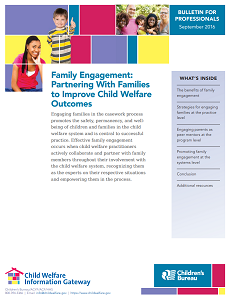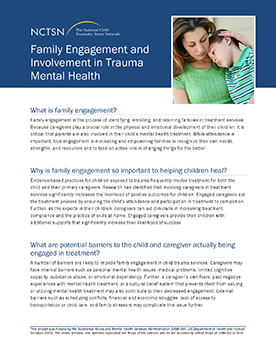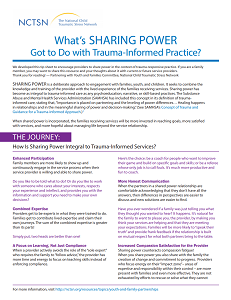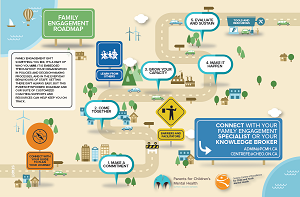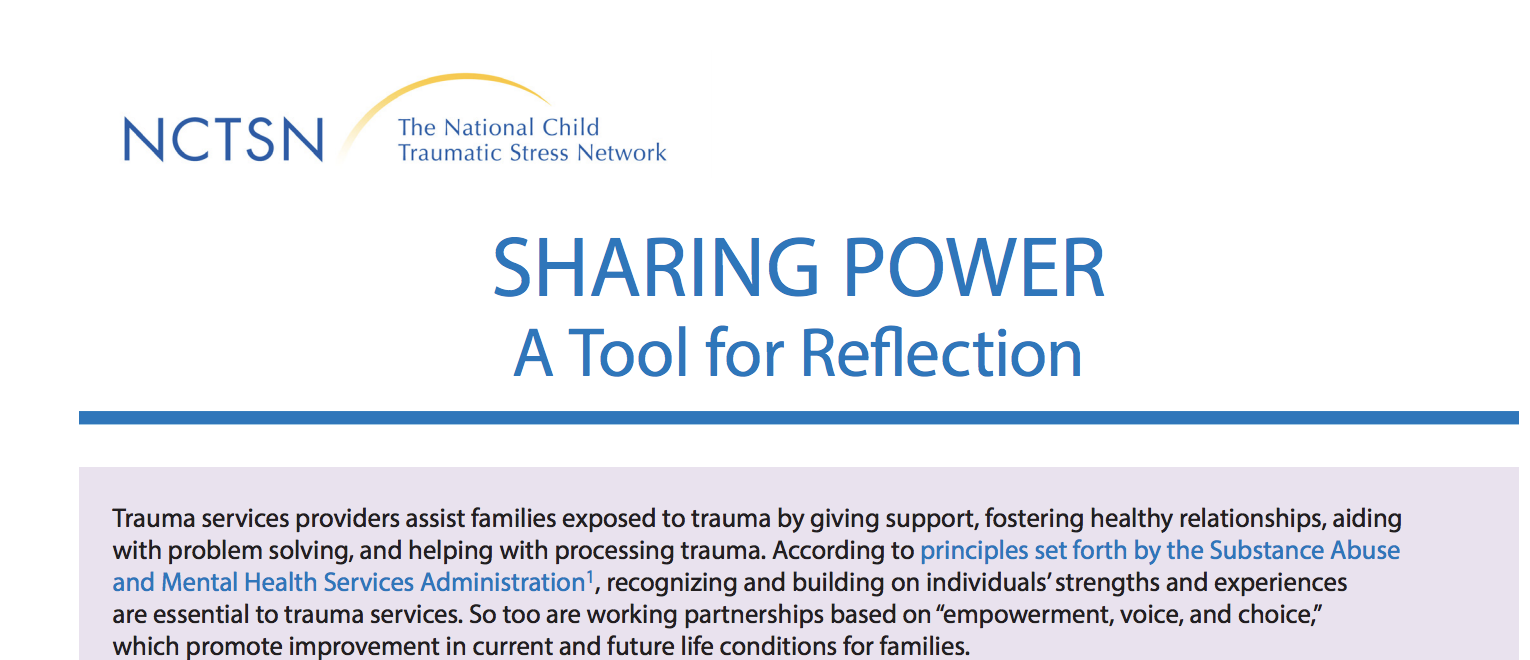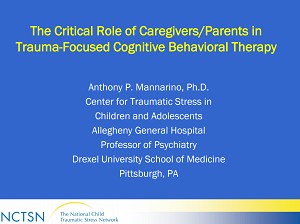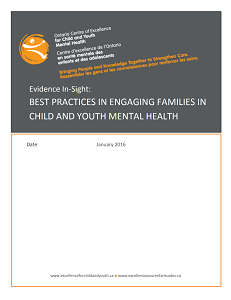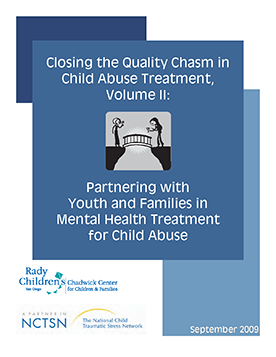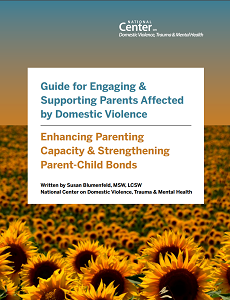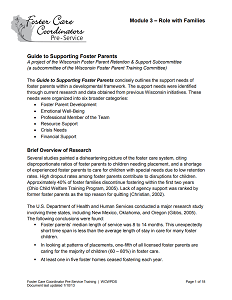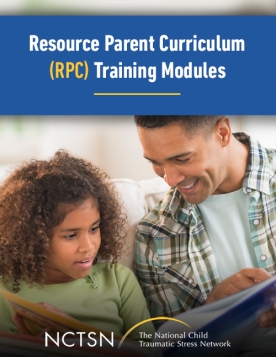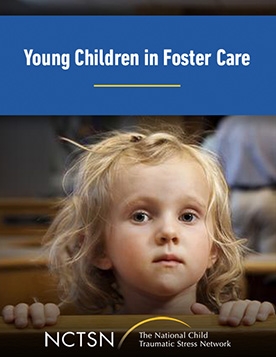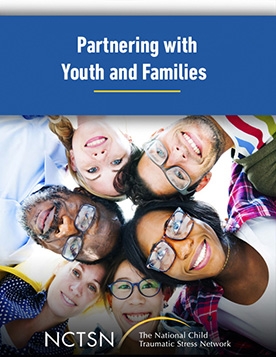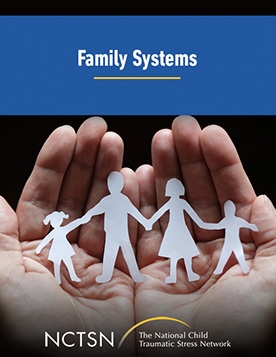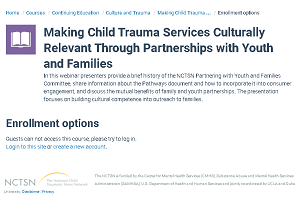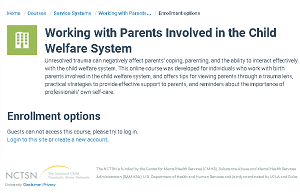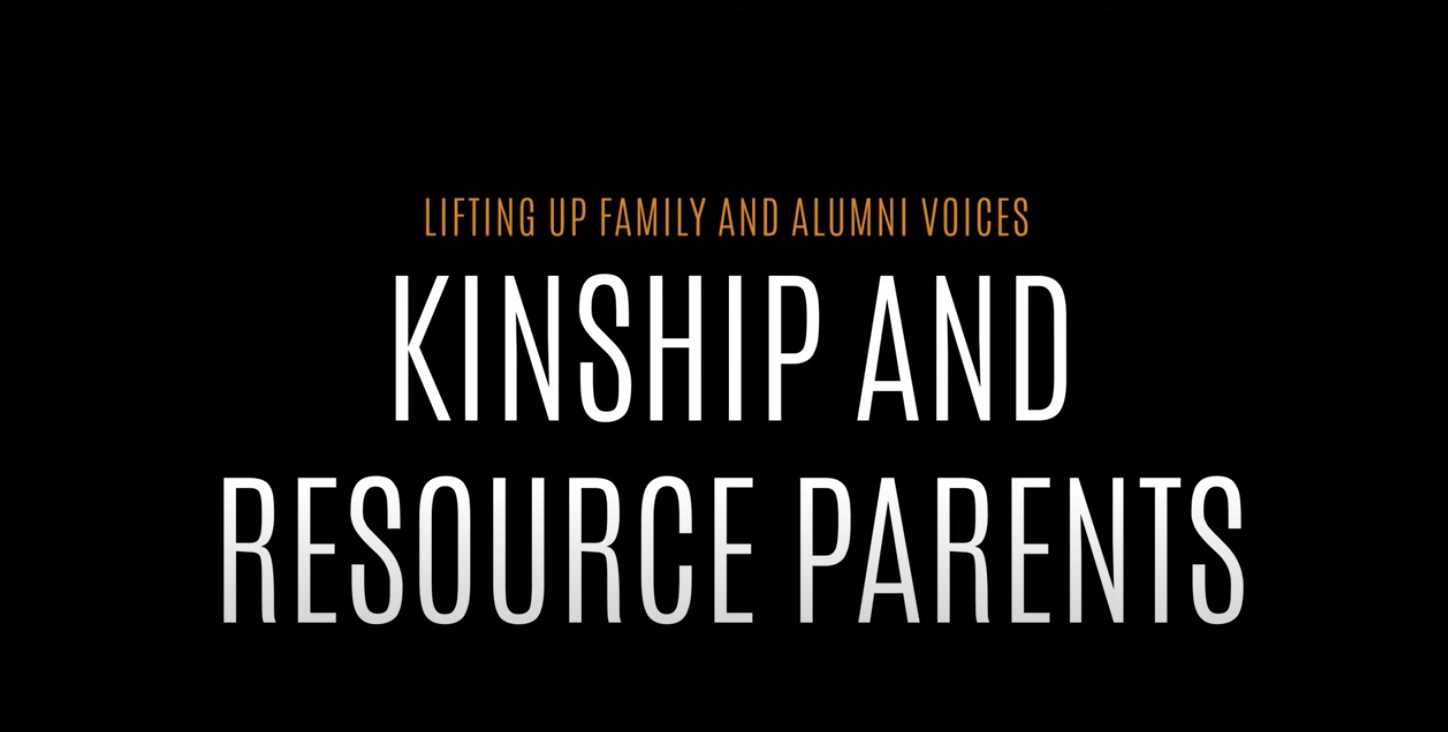-
Family Engagement
Partnering with Children, Youth, & Families
Child Welfare Information GatewayChild WelfareThis 2016 bulletin for professionals discusses the benefits and strategies for engaging families at the practice level and promoting family engagement at the systems level
-
Family Engagement and Involvement in Trauma Mental Health at a CAC
Partnering with Children, Youth, & Families
National Child Traumatic Stress Network (NCTSN)Behavioral HealthThis fact sheet provides information on the importance of family engagement and potential barriers. Discusses specific strategies for family engagement, including how MDT partners can be involved in family engagement.
-
What’s Sharing Power Got to Do with Trauma-Informed Practice?
Partnering with Children, Youth, & Families
National Child Traumatic Stress Network (NCTSN)GeneralThis tip sheet provides information to providers about how to share power in the context of trauma-responsive practice.
-
Family Engagement Roadmap
Partnering with Children, Youth, & Families
Ontario Center of Excellence for Child and Youth Mental HealthGeneralThis evidence-informed roadmap summarizes how to help organizations create a cultural shift that includes meaningfully engaging families.
-
Sharing Power: A Tool for Reflection
Partnering with Children, Youth, & Families
NCTSNChild WelfareWe designed this tool to guide trauma service providers through a series of reflections that will help them identify opportunities to share power in trauma-responsive care. Our hope is that this tool will help you become more comfortable finding answers WITH families instead of FOR them, and that it will lead you to notice opportunities to employ trauma-informed practices throughout the entire service relationship.
-
The Critical Role of Caregivers/Parents in Trauma-Focused Cognitive Behavioral Therapy
Partnering with Children, Youth, & Families
National Child Traumatic Stress NetworkBehavioral HealthThis power point presentation by Anthony Mannarino, Ph.D. discusses the critical role of engaging caregivers in treatment for child trauma.
-
Evidence In-Sight: Best Practices in Engaging Families in Child and Youth Mental Health
Partnering with Children, Youth, & Families
Ontario Centre of Excellence for Child and Youth Mental HealthGeneralThis report discusses available research findings on evidence-informed practices for engaging families in child and youth mental health care, describes the core principles for meaningful engagement, and gives examples of outcomes that have been associated with family engagement
-
Children’s behavioral health needs and satisfaction and commitment of foster and adoptive parents: Do trauma-informed services make a difference?
Partnering with Children, Youth, & Families
Barnett, E., Clearly, S., Butcher, R., Jankowski, M. (2018)Child WelfareFoster and adoptive parents can be severely stressed by children’s mental and behavioral health needs. Many behavioral needs stem from the trauma (abuse and neglect) that children have experienced. We looked at whether trauma-informed mental health and child welfare services lessened the association between children’s behavioral health needs and foster and adoptive parent satisfaction and commitment. We found that for foster parents, as ratings of trauma-informed mental health services increased, the association between child behavioral health needs and parent satisfaction and commitment went away. Mental health services informed by trauma may ease parenting stress and improve parenting satisfaction and commitment.
-
Closing the Quality Chasm in Child Abuse Treatment, Volume II: Partnering with Youth and Families in Mental Health Treatment for Child Abuse (Partner in resource with Chadwick)
Partnering with Children, Youth, & Families
National Child Traumatic Stress Network (NCTSN)Behavioral HealthThis guide is intended for use by mental health treatment providers and by administrators in mental health agencies who are interested in better partnering with youth and families in their service delivery system.
-
Guide for Engaging and Supporting Parents Affected by Domestic Violence
Partnering with Children, Youth, & Families
National Center on Domestic Violence, Trauma, and Mental HealthBehavioral HealthThis guide is designed for staff in domestic violence programs and provides practical guidance for supporting parents affected by domestic violence in their parenting
-
Guide to Supporting Foster Parents
Partnering with Children, Youth, & Families
Wisconsin Foster Parent Retention & Support SubcommitteeChild WelfareThis guide outlines the needs of different types of resource parent within a developmental framework. Needs identified include foster parent development, emotional well-being, professional member of the team, resource support, crisis needs, and financial support.
-
Supporting Youth in Foster Care in Making Healthy Choices: A guide for caregivers and caseworkers on trauma, treatment, and psychotropic medications
Partnering with Children, Youth, & Families
Child Information GatewayChild WelfareThis guide is intended to help caseworkers and caring adults learn more about treatment for youth in foster care, better understand trauma and treatments for trauma, and talk about strategies for helping with youth.
-
Pathways to Partnerships with Youth and Families
Partnering with Children, Youth, & Families
National Child Traumatic Stress Network (NCTSN)GeneralThis document offers agencies a structure for examining and expanding the role of youth and families in their organizations on both the clinical and organizational levels. This document contains two self-assessment questionnaires, offers strategies for increasing youth and family involvement in all aspects of service delivery, and includes useful examples provided by one NCTSN site.
-
Pathways to Partnerships with Youth and Families
Partnering with Children, Youth, & Families
National Child Traumatic Stress Network (NCTSN)GeneralThis document offers agencies a structure for examining and expanding the role of youth and families in their organizations on both the clinical and organizational levels. This document contains two self-assessment questionnaires, offers strategies for increasing youth and family involvement in all aspects of service delivery, and includes useful examples provided by one NCTSN site.
-
Building Successful Resource Families – Practice Guide
Partnering with Children, Youth, & Families
The Annie E. Casey FoundationChild WelfareThis practice guide outlines the importance, challenges, and best practices in working and supporting resource families
-
Building Successful Resource Families – Practice Guide
Partnering with Children, Youth, & Families
The Annie E. Casey FoundationChild WelfareThis practice guide outlines the importance, challenges, and best practices in working and supporting resource families
-
Closing the Quality Chasm in Child Abuse Treatment, Volume II: Partnering with Youth and Families in Mental Health Treatment for Child Abuse (Partner in resource with Chadwick)
Partnering with Children, Youth, & Families
National Child Traumatic Stress Network (NCTSN)Behavioral HealthThis guide is intended for use by mental health treatment providers and by administrators in mental health agencies who are interested in better partnering with youth and families in their service delivery system.
-
Guide for Engaging and Supporting Parents Affected by Domestic Violence
Partnering with Children, Youth, & Families
National Center on Domestic Violence, Trauma, and Mental HealthBehavioral HealthThis guide is designed for staff in domestic violence programs and provides practical guidance for supporting parents affected by domestic violence in their parenting
-
Guide to Supporting Foster Parents
Partnering with Children, Youth, & Families
Wisconsin Foster Parent Retention & Support SubcommitteeChild WelfareThis guide outlines the needs of different types of resource parent within a developmental framework. Needs identified include foster parent development, emotional well-being, professional member of the team, resource support, crisis needs, and financial support.
-
Supporting Youth in Foster Care in Making Healthy Choices: A guide for caregivers and caseworkers on trauma, treatment, and psychotropic medications
Partnering with Children, Youth, & Families
Child Information GatewayChild WelfareThis guide is intended to help caseworkers and caring adults learn more about treatment for youth in foster care, better understand trauma and treatments for trauma, and talk about strategies for helping with youth.
-
Pathways to Partnerships with Youth and Families
Partnering with Children, Youth, & Families
National Child Traumatic Stress Network (NCTSN)GeneralThis document offers agencies a structure for examining and expanding the role of youth and families in their organizations on both the clinical and organizational levels. This document contains two self-assessment questionnaires, offers strategies for increasing youth and family involvement in all aspects of service delivery, and includes useful examples provided by one NCTSN site.
-
Building Successful Resource Families – Practice Guide
Partnering with Children, Youth, & Families
The Annie E. Casey FoundationChild WelfareThis practice guide outlines the importance, challenges, and best practices in working and supporting resource families
-
Resource Parent Curriculum (RPC) Online Course
Partnering with Children, Youth, & Families
National Child Traumatic Stress Network (NCTSN)Child WelfareThis online course offered through the Learning Center of the NCTSN is a source that acts as a precursor for the “Caring for Children Who Have Experienced Trauma: A Workshop for Resource Parents”, to aide resource families in deciding whether the workshop is beneficial to their needs. Face-to-face modules are available to reinforce learning and present to the child’s service team.
-
Optimizing Visitation for Young Traumatized Children and Their Parents/Caregivers
Partnering with Children, Youth, & Families
National Child Traumatic Stress Network (NCTSN)GeneralThis webinar offered through the Learning Center of the NCTSN addresses the important role visitation plays for young foster children and their caregivers. Discusses ways to organize and improve the visit experience, as well as ways to manage children's behavior during and after the visit.
-
Partnering with Youth and Families in Trauma Settings
Partnering with Children, Youth, & Families
National Child Traumatic Stress Network (NCTSN)GeneralThis webinar offers family and professional leadership development ideas addressing the multiple dimensions of partnership with youth and families, including advisory board development, peer-to-peer support programs, and compensation for family members, among other topics.
-
Widening the Lens - Why Include the Family?
Partnering with Children, Youth, & Families
National Child Traumatic Stress Network (NCTSN)GeneralThis webinar offered through the Learning Center of the NCTSN discusses the reasoning and importance of including a family in trauma-informed care. Reviews objectives and core therapeutic strategies that can be used with families to support positive adaptation.
-
Making Child Trauma Services Culturally Relevant Through Partnerships with Youth and Families
Partnering with Children, Youth, & Families
National Child Traumatic Stress Network (NCTSN)GeneralThis webinar offered through the Learning Center of the NCTSN provides a brief history of the NCTSN Partnering with Youth and Families Committee and focuses on building cultural competence in outreach to families. Accessing this resource requires a free registration at https://learn.nctsn.org/. Once you have a registration and are signed on you can either use the link on this page or search the name of the resource on the NCTSN Learning Center website to access this resource.
-
Partnering with Youth and Families
Partnering with Children, Youth, & Families
National Child Traumatic Stress Network (NCTSN)Behavioral HealthThis webinar offered through the learning center on the NCTSN’s website suggests practical ways to partner with youth and families within treatment settings based on different resources and organizational structures. This webinar reflects the perspectives of providers, family members, and youth. Accessing this resource requires a free registration at https://learn.nctsn.org/. Once you have a registration and are signed on you can either use the link on this page or search the name of the resource on the NCTSN Learning Center website to access this resource.
-
How to Include Families- Effective Models
Partnering with Children, Youth, & Families
National Child Traumatic Stress Network (NCTSN)GeneralThis webinar offered through the Learning Center of the NCTSN presents effective and promising engagement strategies that support families in the aftermath of a trauma exposure.
-
Working with parents involved in the child welfare system
Partnering with Children, Youth, & Families
National Child Traumatic Stress Network (NCTSN)Child WelfareThis online course offered through the Learning Center of the NCTSN was developed for individuals who work with birth parents involved in the child welfare system. It offers tips for viewing parents through a trauma lens and practical strategies to provide effective support to parents. Accessing this resource requires a free registration at https://learn.nctsn.org/. Once you have a registration and are signed on you can either use the link on this page or search the name of the resource on the NCTSN Learning Center website to access this resource.
-
Lifting Up Voices
Partnering with Children, Youth, & Families
Casey Family ProgramsGeneralThis YouTube video features the voices of families and alumni of foster care who share about their real world experiences with Child Welfare systems. They also share their vision for the future for Child Welfare systems that helps all families thrive and thoughts on what it takes to build Communities of Hope.
-
Resource Parent Curriculum (RPC) Online Course
Partnering with Children, Youth, & Families
National Child Traumatic Stress Network (NCTSN)Child WelfareThis online course offered through the Learning Center of the NCTSN is a source that acts as a precursor for the “Caring for Children Who Have Experienced Trauma: A Workshop for Resource Parents”, to aide resource families in deciding whether the workshop is beneficial to their needs. Face-to-face modules are available to reinforce learning and present to the child’s service team.
-
Optimizing Visitation for Young Traumatized Children and Their Parents/Caregivers
Partnering with Children, Youth, & Families
National Child Traumatic Stress Network (NCTSN)GeneralThis webinar offered through the Learning Center of the NCTSN addresses the important role visitation plays for young foster children and their caregivers. Discusses ways to organize and improve the visit experience, as well as ways to manage children's behavior during and after the visit.
-
Partnering with Youth and Families in Trauma Settings
Partnering with Children, Youth, & Families
National Child Traumatic Stress Network (NCTSN)GeneralThis webinar offers family and professional leadership development ideas addressing the multiple dimensions of partnership with youth and families, including advisory board development, peer-to-peer support programs, and compensation for family members, among other topics.
-
Widening the Lens - Why Include the Family?
Partnering with Children, Youth, & Families
National Child Traumatic Stress Network (NCTSN)GeneralThis webinar offered through the Learning Center of the NCTSN discusses the reasoning and importance of including a family in trauma-informed care. Reviews objectives and core therapeutic strategies that can be used with families to support positive adaptation.
-
Making Child Trauma Services Culturally Relevant Through Partnerships with Youth and Families
Partnering with Children, Youth, & Families
National Child Traumatic Stress Network (NCTSN)GeneralThis webinar offered through the Learning Center of the NCTSN provides a brief history of the NCTSN Partnering with Youth and Families Committee and focuses on building cultural competence in outreach to families. Accessing this resource requires a free registration at https://learn.nctsn.org/. Once you have a registration and are signed on you can either use the link on this page or search the name of the resource on the NCTSN Learning Center website to access this resource.
-
Partnering with Youth and Families
Partnering with Children, Youth, & Families
National Child Traumatic Stress Network (NCTSN)Behavioral HealthThis webinar offered through the learning center on the NCTSN’s website suggests practical ways to partner with youth and families within treatment settings based on different resources and organizational structures. This webinar reflects the perspectives of providers, family members, and youth. Accessing this resource requires a free registration at https://learn.nctsn.org/. Once you have a registration and are signed on you can either use the link on this page or search the name of the resource on the NCTSN Learning Center website to access this resource.
-
How to Include Families- Effective Models
Partnering with Children, Youth, & Families
National Child Traumatic Stress Network (NCTSN)GeneralThis webinar offered through the Learning Center of the NCTSN presents effective and promising engagement strategies that support families in the aftermath of a trauma exposure.
-
Working with parents involved in the child welfare system
Partnering with Children, Youth, & Families
National Child Traumatic Stress Network (NCTSN)Child WelfareThis online course offered through the Learning Center of the NCTSN was developed for individuals who work with birth parents involved in the child welfare system. It offers tips for viewing parents through a trauma lens and practical strategies to provide effective support to parents. Accessing this resource requires a free registration at https://learn.nctsn.org/. Once you have a registration and are signed on you can either use the link on this page or search the name of the resource on the NCTSN Learning Center website to access this resource.
-
Lifting Up Voices
Partnering with Children, Youth, & Families
Casey Family ProgramsGeneralThis YouTube video features the voices of families and alumni of foster care who share about their real world experiences with Child Welfare systems. They also share their vision for the future for Child Welfare systems that helps all families thrive and thoughts on what it takes to build Communities of Hope.
